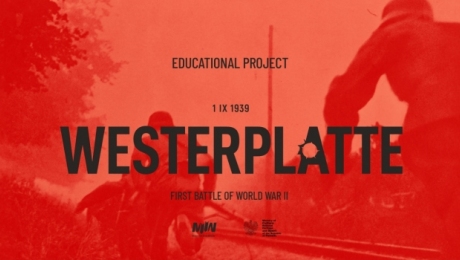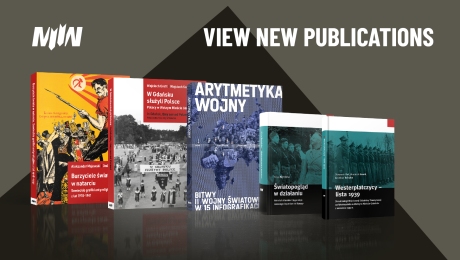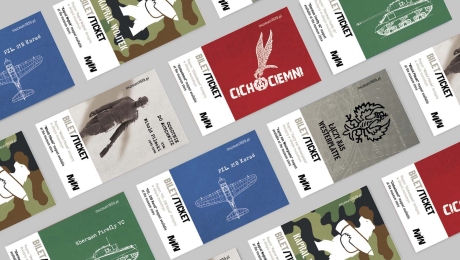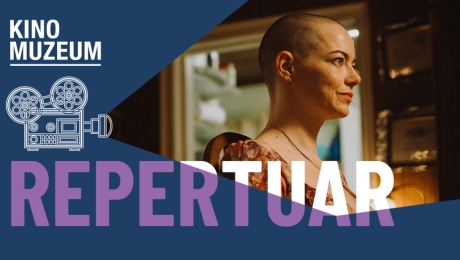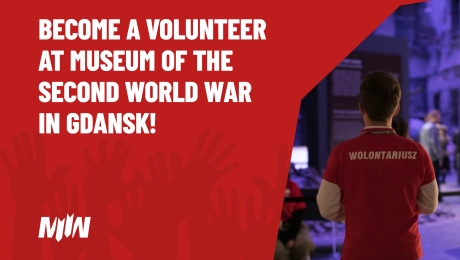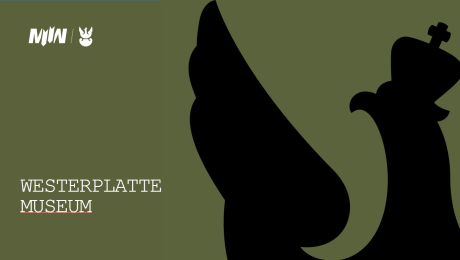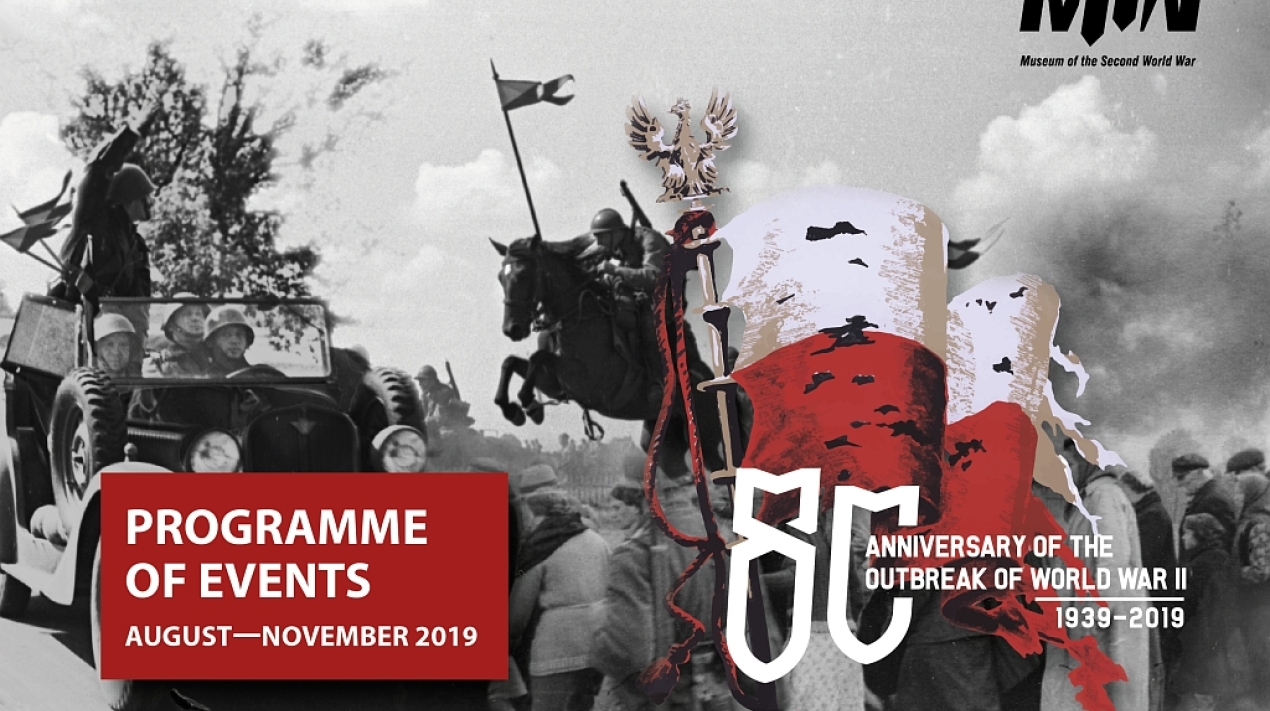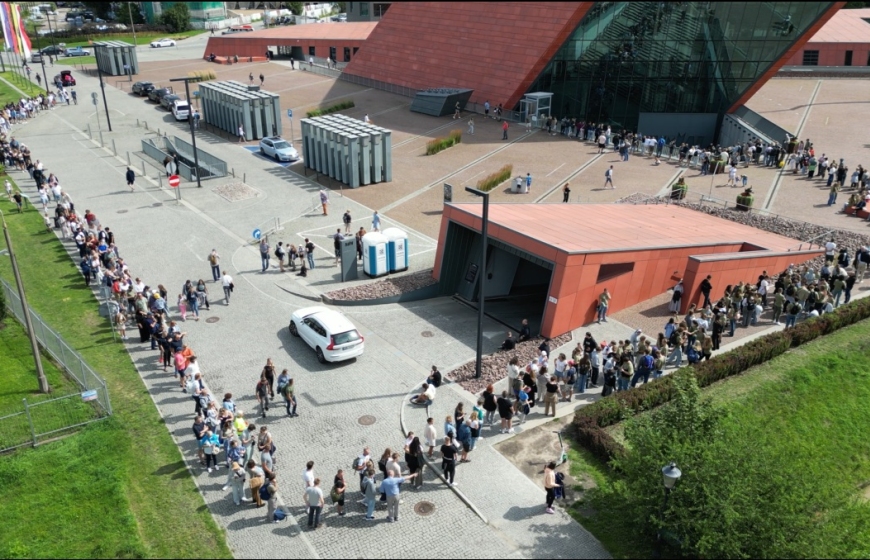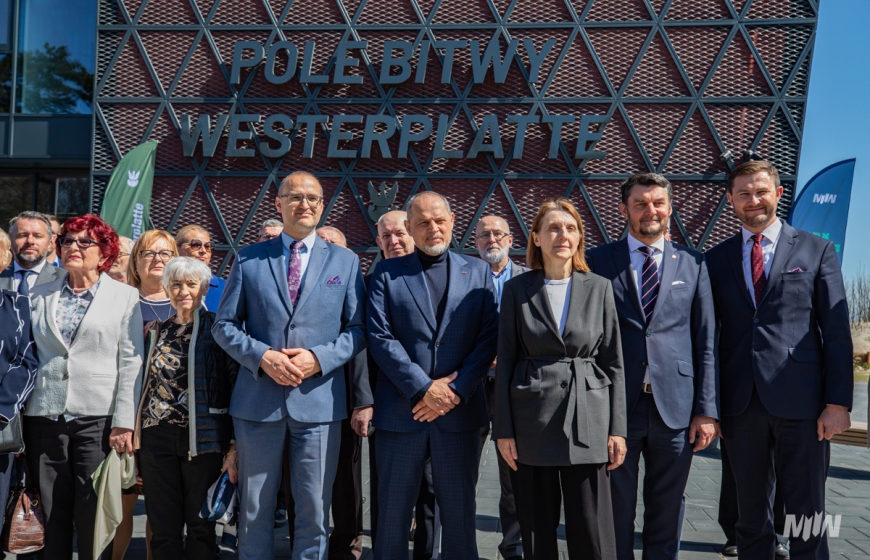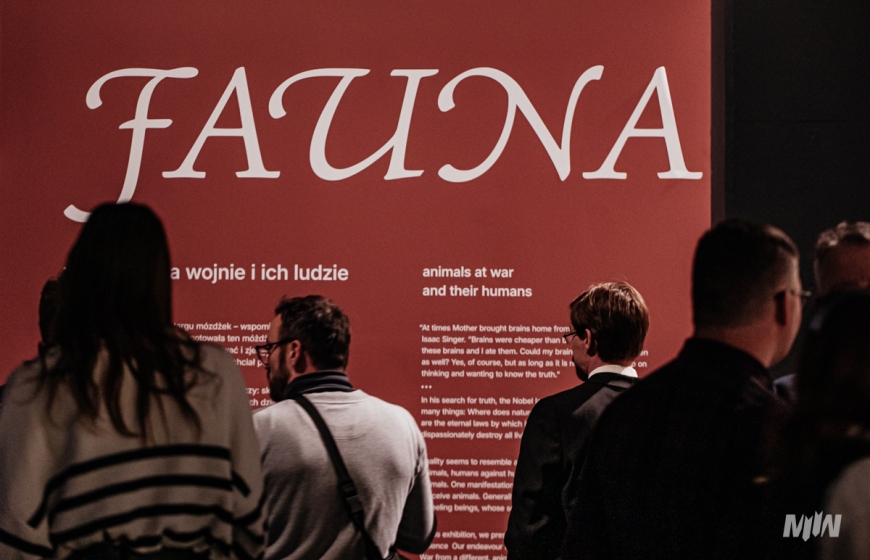80th Anniversary of the Outbreak of World War II | Programme of Events
PROGRAMME OF EVENTS
AUGUST-NOVEMBER 2019
23-25 AUGUST 2019
Multimedia show “Poland: First to Fight”
A modern and attractive multimedia show using innovative technologies, such as 3D mapping, diode mapping and large-surface mapping combined with a specially prepared soundtrack and a large-format animation entitled “Poland: First to Fight”. The animation was created to commemorate, in a dignified, solemn and attractive way, the Polish contribution to the victory over Nazism, as well as to pay tribute and express respect and gratitude to the heroes who sacrificed their lives for Poland's independence. The show is scheduled to take place on the square in front of the Museum. Between 23 and 25 August, the show will be repeated 3 times every evening.
23-24 AUGUST 2019
International scientific conference “The Pact for War. The collusion of 23 August 1939 between Hitler and Stalin from a contemporary perspective 80 years after the outbreak of the Second World War”
23 August 2019 is the 80th anniversary of the signing of the Molotov-Ribbentrop Pact. The Pact was accompanied by a secret protocol in which Hitler and Stalin defined the spheres of influence of the Third Reich and the Soviet Union in Central and Eastern Europe. The significance of that document for the outbreak of World War II cannot be overestimated. The pact concluded between the two dictators on the night between the 23 and 24 of August changed the world. Apart from the 4th partition of Poland, the secret protocol also provided for the rearrangement of the territories belonging to Finland, Estonia, Latvia, Lithuania, Latvia and Bessarabia. The so-called non-aggression pact was actually concluded to finalize Stalin’s and Hitler’s aggressive plans against independent states, which were to be subordinated to the interests of Germany and of the USSR.
On the 80th anniversary of the signing of the Molotov-Ribbentrop Pact of aggression against the countries of Central and Eastern Europe, the Museum of the Second World War organizes a two-day international conference for historians from the countries affected by that document. As the initiator of the conference, we hope that it will provide a forum for meetings and discussions on the long-term consequences of that secret protocol for particular countries ravaged by the Second World War. Another important element of the conference will be a separate panel consisting of museum workers from several countries who will share their experience in creating a museum narrative on the origins of the Second World War.
1 SEPTEMBER 2019
Vernissage of a temporary exhibition “Fighting and Suffering. Polish citizens during the Second World War”
The exhibition is designed as an interdisciplinary project based on a variety of forms, media and scenographic solutions. They are woven into a cohesive story about the Polish experience of World War II, which provides vivid insights into the horror and tragedy of those times. The exhibition has a well-thought-out structure with precisely measured chronology and dramaturgy and contains various information on the wartime period. The exhibition is intended to have a strong emotional impact on visitors in order to make them aware of the horrors of the Second World War in the most suggestive way. At the same time, it highlights the events and phenomena that demonstrate the uniqueness of the Polish experience.
International exhibition project “Fighting and suffering”
“Fighting and suffering” is an international project carried out by the Museum of the Second World War in cooperation with the Ministry of Foreign Affairs of the Republic of Poland. As planned by its organizers, starting from 1 September 2019, the exhibition will be presented in several dozen Polish institutions abroad on 6 continents in cities such as Washington, Brasília, Mexico, Edinburgh, Vienna, Belgrade, Amman, Djakarta and Canberra. The exhibition is an attractively presented story about the Polish experience of the Second World War. In particular, it depicts the tragedy of the war and the efforts of the Polish soldiers fighting for the independence of their homeland. The exhibition is aimed to provide information about the attitudes of Polish citizens in the face of the overwhelming force of the aggressors and then occupiers.
Musical performance “This is How the War Began”
“This is How the War Began” – this seemingly ordinary title encompasses everything that happened in September 1939 – the struggle for survival, fear, despair, powerless anger of people who were deprived of their right to lead a normal life, but also the heroism of Poles and bestiality of the occupiers who arrived with a plan to exterminate the Polish population. The show will be based on works concerned with the tragedy of the war. The songs to be performed during the concert are based on poems of Polish contemporary poets. The show will also incorporate fragments of historical dialogues and authentic documents, as well as stories of individual people and heroic civilians. They will be presented by the most outstanding contemporary artists – Polish renowned music performers. The concert will be divided into a dozen or so parts, each focusing on the history of symbolic Polish cities, affected by that greatest tragedy of the 20th century.
Premiere of the spot “1939. Memory and message”
The Museum of the Second World War is producing a special spot commemorating the outbreak of the war. It is intended to warn future generations about the calamities of the war. In the spot, the war is also remembered as an especially challenging time which requires one to fight for the independence of one’s homeland. The spot is to feature not only witnesses of historical events, but also representatives of the post-war generation, including state authorities.
Laying of the foundation stone for the Museum of Westerplatte and War 1939 in the historical 'Power plant' at Westerplatte
Museum of Westerplatte and War 1939 - branch of the WWII Museum in Gdansk, will present a temporary exhibition in the historical building of Power plant. The exhibition will consist of artifacts acquired during the archeological research on the spot. Opening of the exhibition will start with laying the foundation stone for the planned Museum of Westerplatte and War 1939.
7 SEPTEMBER 2019
A match that did not take place - a historical and sports show
If the Second World War had not broken out on 1 September 1939, life would have continued as normal.
Football tournaments would have been held as normal, too. “The match that did not take place” – a reconstruction of a hypothetical match between the teams of Gedania and Lechia Lviv will be shown to the public at the football stadium in Traugutta Street in Gdansk on 7 September. The “Match that did not take place” will be preceded by football matches played by the youngest players, adding to the atmosphere of a family picnic during the entire event.
17 SEPTEMBER 2019
The unveiling of a monument commemorating Captain Witold Pilecki at the Museum of the Second World War in Gdańsk
Witold Pilecki is a hero who personifies the struggle of Poles for a free and independent homeland. The Museum of the Second World War has decided to honour this great man by building his monument on the square next to its headquarters. For museum visitors, the monument will symbolize Captain Pilecki’s exemplary heroism in the face of the evil and cruelty of the Second World War.
28 SEPTEMBER 2019
The ceremony of presenting the Lieutenant Colonel Jan Kowalewski Award
The Award was established to honour the memory of Lieutenant Colonel Jan Kowalewski – a mathematician, cryptologist and linguist – and to pay homage to people who work for the common good by using the power of their brains, as well as the knowledge and skills acquired by them, in accordance with the “Reason Before Force” principle. The project has arisen from the cooperation between the Museum of the Second World War in Gdańsk and the Gdańsk University of Technology. In each edition, there will be four winners: two Poles and two foreigners from two age categories. It is a financial award. In addition, the recipient of the award will receive a bronze statue made by Professor Stanisław Radwański. The Lieutenant Colonel Jan Kowalewski Award is to be presented cyclically on an annual basis.
"War and Memory" - a programme to be broadcast in 2019 by the Polish Public Television (TVP)
The Museum of the Second World War in Gdańsk in cooperation with the Polish Television has prepared a series of television programmes with a working title “War and Memory”. The series is to consist of fifteen-minute talks between the director of the Museum of the Second World War and invited guests. Each episode presents wartime experiences of various nations during the Second World War and the current state of knowledge about wartime events in Poland and in the native countries of speakers. The guests of the programme to be broadcast in 2019 will include historians, scientists, writers and other professionals interested in issues connected with that terrible global disaster. Up to now, recordings have been made with Professor Ziyabek Kabuldinov, Luo Cunkang, Jacek Fairweather, Aileen Utterdyke, Professor Stephen Hicks and Professor Tadeusz Wolsza.
NOVEMBER 2019
Premiere of a documentary entitled “Gdańsk of 1939”
The film “Gdańsk of 1939” is a documentary with numerous educational values. It will present the events that took place in Gdańsk in 1939 in a clear and understandable way. The film will use photograph collections, documents and film-making notes of the Museum of the Second World War in Gdańsk as well as materials from other national and foreign collections. The film will look into a number of previously ignored topics, including the persecution of the Jewish population of Gdańsk. The presented material will also focus on the terror inflicted by the Germans on the Polish residents of the city.
ANNUAL EVENTS CALENDAR: www.muzeum1939.pl/80rocznica






